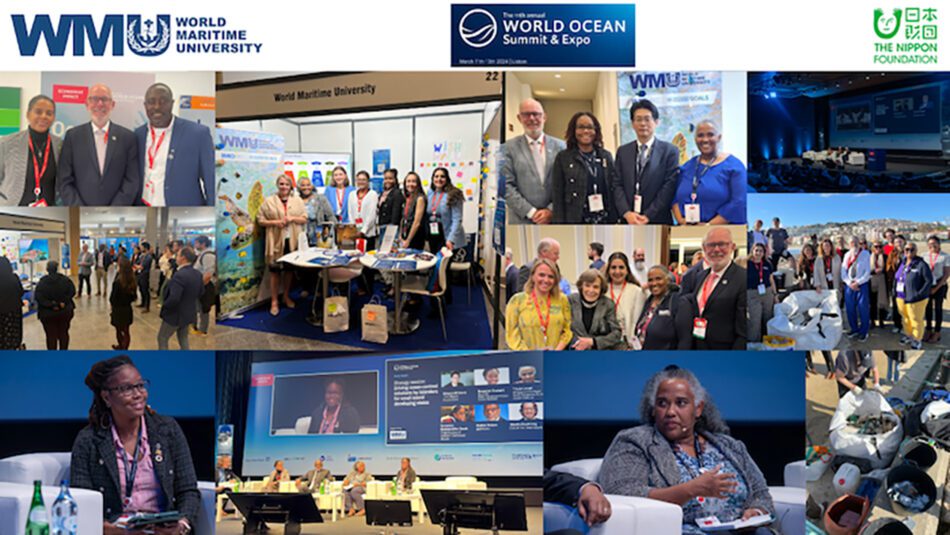WMU and OECS Collaborate at Annual World Ocean Summit

From Danny Moonie Communications / Knowledge Management Specialist, Organisation of Eastern Caribbean States. Release Courtesy World Maritime University
March 27, 2024 — From 11 to 13 March 2024, the World Maritime University – Sasakawa Global Ocean Institute (GOI) contributed to The Economist Impact 11th annual World Ocean Summit and Expo held in Lisbon, Portugal. The Summit featured more than 200 expert speakers with an agenda focused on ocean health, climate solutions and industry strategies for a sustainable ocean economy.
The GOI co-hosted a Strategy Session on 12 March with the Economist Impact titled “Driving ocean-centred solutions by islanders for small island developing states (SIDS)”. The session opened with a keynote address by Mr. Mitsuyuki Unno, Executive Director of The Nippon Foundation. This was followed by a panel that included WMU PhD graduates Dr. Roxanne Graham and Dr. Tricia Lovell of the Nippon Foundation-WMU Closing the Circle Programme, as well as Ms Susanna Debeauville-Scott from The Organisation of Eastern Caribbean States (OECS), and His Excellency Honorable Walter Roban, Deputy Premier of Bermuda and the Minister of Home Affairs of the Government of Bermuda. Moderated by the Global Director of Impact at the Forum for the Future, Mr. Martin Koehring, the session explored several topics critical for SIDS including the challenges of waste management, plastics pollution, limited economic opportunities, and accessibility to global processes in island nations as well as how they may turn the tide through education, financing, local investment in technology and innovation.
The GOI team showcased the research findings and WMU educational programmes in the Exhibition Hall, which was visited by many of the 1,200 delegates attending the Summit. A notable highlight was the launch of a video about the Blue Planning in Practice workshop and High-Level Blue Economy Roundtable that were delivered in collaboration with OECS in April 2023 in Saint Lucia within the framework of the Closing the Circle Programme. The workshop included the OECS Ocean Governance Team (OGT) and the Roundtable was attended by several ministers from OECS member States. The video, jointly produced with OECS, showcases the importance of Marine Spatial Planning (MSP) and the Blue Economy in the Eastern Caribbean region and the need for collaboration to support on-going work through capacity development training, outreach and research.

screenshot To view video click HERE
About the WMU-Sasakawa Global Ocean Institute
The World Maritime University’s WMU-Sasakawa Global Ocean Institute (GOI) is an independent focal point for the ocean science-policy-law-industry-society interface where policymakers, the scientific community, regulators, industry actors, academics, and representatives of civil society meet to discuss how best to manage and use ocean spaces and their resources in accordance with the United Nations 2030 Agenda for Sustainable Development. The Institute was inaugurated in May 2018 and made possible through generous support from The Nippon Foundation of Japan, the Governments of Sweden, Canada, and Germany, as well as the City of Malmö.
About the Closing the Circle Programme
The “Closing the Circle” Programme: Marine Debris, Sargassum and Marine Spatial Planning, is hosted at the WMU-Sasakawa Global Ocean Institute with the generous funding from The Nippon Foundation. The programme team consists of the Project Principal Investigators, a Research Fellow and 4 PhD candidates whose research on respective projects explore challenges and advance potential solutions to marine debris, sargassum threats and marine spatial planning (MSP) in Small Island Developing States (SIDS) with a particular focus on the Eastern Caribbean region. The Region is facing a mounting problem from vast beach strandings of the normally oceanic seaweed Sargassum. The combination of marine debris and Sargassum seaweed is resulting in an untold ecological impact and socioeconomic hardship for these SIDS that are highly dependent on tourism. Marine spatial planning (MSP) has emerged as a new approach to holistically plan and manage ocean space and resources.





